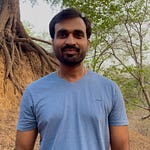The Tracking Indian Youth Attitudes Media Fellowship presents the first in a series of stories capturing the socio-political views and experiences of young people across India.
“Education should be the top priority. My aunt, a government school teacher, sees how much children love studying and coming to school everyday. I must mention that mid-day meals are a big incentive for them to attend. If not for the meals, they'd be forced to work at fields by they're parents. Where I come from, education is the only way that people can lift themselves and their families out of poverty" observes Gunjan Tirmale, a 25-year-old artist based in Mumbai.
Originally from Shahada, a town in Maharashtra’s northwest, Gunjan has come to Mumbai with many dreams—acting, modeling, making a film about her homeland, and eventually starting her own business. For now, she freelances as a cinematographer and editor, navigating the city's creative hustle. In this conversation, she opens up about her journey, struggles, and aspirations.
Read her full story below. Profile by Jyotsna Singh.
Jyotsna: Gunjan, tell me about Shahada. What life was like growing up there?
Gunjan: Shahada is in Maharashtra’s Nandurbar district, an Adivasi region home to many tribal communities. There’s a strong sense of community there, and multiple tribal languages are spoken. Our language, Ahirani, a dialect of Marathi that sounds like Gujarati.
Growing up was fun. My friends and I called ourselves rebels—we played cricket with the boys, despite objections from the neighbourhood aunties and uncles. Every Ganpati, I was the one collecting money for the pandal. I always wanted to do what only boys were allowed to, but thankfully, my parents—my father, a transport business owner, and my mother, a homemaker—never stopped me, as long as I kept up with my studies.
Jyotsna: When did you first realise the difference between being a girl and being a boy in society?
Gunjan: Before my brother was born, we were a family of four—my parents, me, and my younger sister. I would often hear relatives and neighbours say, “Wish you had a son. The family would be complete if only you had a son.” That’s when I first noticed the difference. It made me want to be like a boy—I started dressing like them and playing cricket.
Jyotsna: Have you faced gender bias in Mumbai, especially in your field?
Gunjan: There’s an obvious objectification of women in the industry, but it’s not just limited to acting. As a freelance cinematographer and editor, my work is highly technical, yet the first reaction I get is doubt. “Will you be able to do it?” or “You won’t understand this; it’s too complicated.” At first, I thought it was because I was new, but over time, I realized it’s also because I’m a woman. People assume I won’t grasp the technical aspects as well as a man would.
Jyotsna: Do you get enough time to catch up on news and current affairs?
Gunjan: I don’t go out of my way to look things up, but I get my news from Instagram. I avoid TV news—it’s just about proving one side wrong and the other right. There’s no real discussion, just blame-shifting. But my parents and grandparents watch debates on TV regularly.
Jyotsna: Do you trust the news you read on Instagram?
Gunjan: I trust a few news platforms and journalists, but in today’s world, you can’t trust anyone completely. It’s more about narratives than facts.
Jyotsna: Your family follows TV news—do they believe everything on those debate shows?
Gunjan: Yes. Most people live in ignorance, and I think our culture is to blame. We treat our leaders like kings, as if they can do no wrong. Growing up, our heroes were film stars and athletes, but now, it’s all about protecting one religion. In my hometown, I see so much rage and arrogance. Festivals and processions have become less about celebration and more about displaying power over other communities.
Jyotsna: Has it always been this way, or has something changed?
Gunjan: No, this is new. In the last few years, a fear has been created—people are made to believe that their religion and identity are under threat. And fear, not love, is what drives them to follow political leaders. But religion doesn’t need protection—it has survived for centuries. It was never meant to harm others.
Jyotsna: Do you think religion should be a part of political discourse as it is now?
Gunjan: No. Political parties should focus on real issues, like women’s safety, instead of building temples. Shivaji Maharaj never let religion dictate politics—he welcomed all communities into his army. But today, his image has been altered to fit political agendas. It’s ironic—leaders show more empathy for mythological characters than for victims of rape and domestic violence. The current climate is killing creativity. People no longer want to connect with one another. The first lens you see people through is religion now, even if it is subconsciously.
Jyotsna: What issues would you like political leaders to focus on instead?
Gunjan: Women’s safety is my biggest concern. Mumbai is safer for women, but back home in Shahada, I’ve faced eve-teasing and even been flashed multiple times. Beyond that, I want leaders to address waste management, the working conditions of sewer workers, the water crisis, and climate change.
Jyotsna: What about education and employment? You come from a tribal land, and there’s always a debate around the reservation system in education and jobs. Do you think it has helped the people there?
Gunjan: Education should be the top priority. My aunt, a government school teacher, sees how much children love studying and coming to school everyday. I must mention that mid-day meals are a big incentive for them to attend. If not for the meals, they'd be forced to work at fields by they're parents. Where I come from, education is the only way that people can lift themselves and their families out of poverty.
About the reservation system, I know there’s a sentiment against it—every group sees the other as undeserving. But I come from the NT-B (Nomadic Tribes - B) category myself, and I’ve seen firsthand how it has helped my community move forward in life. Without it, many wouldn’t have access to opportunities that others take for granted.
Jyotsna: Looking back at your journey—from Shahada to Mumbai, chasing your dreams—what does success mean to you now?
Gunjan: Success, to me, is being independent in every sense—financially, emotionally, and mentally. I want to do a lot of things. Right now, I’m exploring modeling, but I also want to find work as an actor, make a film about my homeland someday, and eventually start my own business.
This is an ongoing series of profiles documenting the experiences of young people across India. Stay tuned for more stories from the youth of India. Follow us on social media for more updates.













Share this post